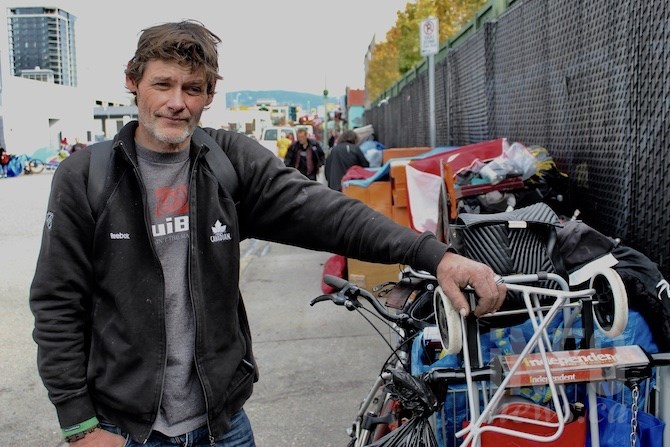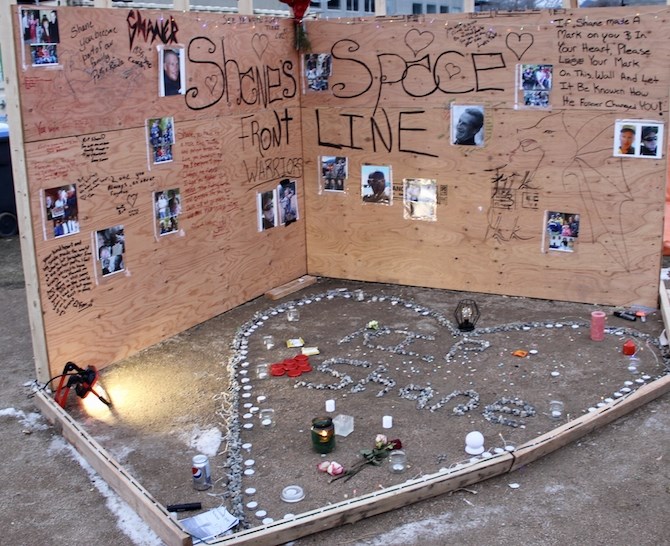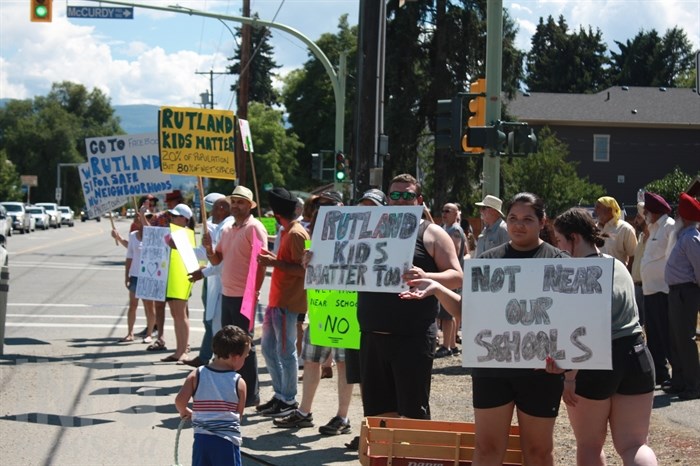
Dave Caul was camped out on Leon Avenue about this time last year.
(ROB MUNRO / iNFOnews.ca)
December 13, 2020 - 7:00 AM
Since much of the news in 2020 has been about COVID-19, the plight of Kelowna’s hundreds of homeless residents has slipped below the radar.
That doesn’t mean they’ve gone away or been forgotten by people who work every day trying to get them housed. For the most part, those efforts have succeeded this winter.
“We still have a couple of dozen folk sleeping outside at the moment,” Stephanie Ball, the executive director of the Central Okanagan Journey Home Society, told iNFOnews.ca. “We’re working with B.C. Housing and the city to make sure everyone has somewhere to shelter this winter.”
This morning, the RCMP, city bylaws officers and outreach workers counted 16 people still sleeping rough while 12 of 262 indoor shelter beds went unused.
To Ball’s way of thinking, that probably means a couple of dozen were outside overnight, since they may not all have been seen.
Contrast that to a year ago when 60 to 80 people living in tents on Leon Avenue were relocated to a city-run campground on Recreation Avenue.
READ MORE: Shutdown of Kelowna homeless tent city catches campers by surprise
There, they had to pack up their tents and all their belongings by 9 a.m. and wander off until they were allowed to set up again in the evening.
There, as well, 39-year-old Shane Bourdin died of a drug overdose in the early hours of Dec. 16.
READ MORE: The homeless man who died in Kelowna this week was loved by many

This memorial was set up at the Recreation Avenue tent camp after Shane Bourdin died there last December.
(ROB MUNRO / iNFOnews.ca)
The first temporary winter shelter wasn’t opened until mid-December last year and the final campers weren’t housed until well into January.
During the past year, 139 supportive housing units were opened. Some other people were placed in “scattered sites” or helped out with rent subsidies.
Despite the new housing, the total number of homeless people in Kelowna is higher than it was last year, Ball said.
There are also 48 people, who, because of COVID-19 and their compromised immune systems, have been put up in two motels, one in Kelowna and one in West Kelowna.
Two winter shelters have already opened. Combined with the more permanent shelters, such as Cornerstone and the Gospel Mission on Leon Avenue, there are now 262 indoor beds, which is more than last year but still, not quite enough.
“It speaks to the fact that, as fast as we can support people, people still fall into homelessness,” Ball said.
It seems that some people became homeless due to the economic impacts of COVID-19.
Although she doesn’t yet have data to back it up, front line workers are seeing many new faces, Ball said.
COVID may also have contributed to the fact that winter shelter space was opened so much earlier this year.
“I think that COVID certainly has helped in terms of there being a greater interest in ensuring the safety and well being of people experiencing homelessness,” Ball said. “I think sometimes it’s easier to put aside all the other things that don’t matter when you’re really just focussed on saving lives and managing potential outbreaks in pandemics.”
Another 79 housing units will open in the next couple of months. One is a 49-unit supportive housing complex on McCurdy Road that sparked community outrage and a 13,000-name petition last year.
READ MORE: Kelowna mayor shrugs off McCurdy Road supportive housing petition

Dozens of protesters gathered on McCurdy Road on June 30, 2019.
(SEAN MOTT / iNFOnews.ca)
Another 15 units for homeless youths are being built by a developer of a multi-unit housing complex.
That has helped but more needs to be done. Ball is working with B.C. Housing, the federal government is investing major dollars into addressing homelessness and there’s even a community group looking into housing homeless veterans.
Certainly, much more needs to be done before temporary winter shelters are a thing of the past.
“As much as it’s about protecting people and keeping them warm through shelters this winter, we never lose sight that the end game at Journey Home is about housing and getting ahead of the curve to the point where we can develop and implement housing in the community faster than people are falling into homelessness,” Ball said.
It was also a year ago that Ball was hired as the executive director for Journey Home, which has the goal of getting to functionally zero homelessness in Kelowna by 2024.
She’s not taking the credit for the changes that have happened over the past year.
“We had some new leadership as well within service-providing organizations,” she said. “There’s been two or three new leaders that have come into long standing organizations and they’ve brought a different way of doing things and a different level of leadership that I think has enhanced organizations’ willingness and capacity to do things differently.”
She singled out Carmen Rempel, the new executive director of the Gospel Mission that opened a winter shelter in the former Kelowna Daily Courier building along with Amber Webster-Kotak who took the lead on re-opening the Welcome Inn shelter for this winter.
“Those two organizations stepped up to support the opening of those two shelters,” Ball said. “They’re fantastic women and are just really working hard to be part of the solution.”
She also praised the City of Kelowna and B.C. Housing for their contributions.
Kelowna City Council, during budget deliberations this week, agreed to continue to pay $150,000 a year to help fund Journey Home but declined to contribute another $100,000 that had been requested.
Ball said the efforts to deal with homelessness need to be scaled up. Despite some success at fundraising, Journey Home is caught in a bind when it comes to raising money.
It is a registered non-profit organization but has yet to be authorized by Revenue Canada to issue tax receipts for donations.
That means it’s not eligible for some government grants.
Donations, however, can be made to the Central Okanagan United Way and directed to Journey Home. That way, the donors can get tax receipts.
To contact a reporter for this story, email Rob Munro or call 250-808-0143 or email the editor. You can also submit photos, videos or news tips to the newsroom and be entered to win a monthly prize draw.
We welcome your comments and opinions on our stories but play nice. We won't censor or delete comments unless they contain off-topic statements or links, unnecessary vulgarity, false facts, spam or obviously fake profiles. If you have any concerns about what you see in comments, email the editor in the link above.
News from © iNFOnews, 2020